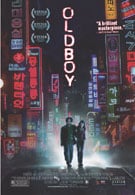Winner of the Grand Prix prize at Cannes, the Korean film Old Boy has been getting raves around the world for months now. This year, it’ll slowly work its way into a few theaters in the U.S. before being brutally remade by Hollywood into an American revenge pic starring Nicholas Cage. Because I’m a big dumb American, there’s a good chance I’ll like that version of it better, but till then the Korean one has my attention.
The film opens with a man hanging over the edge of a building, suspended only by his tie, held in the hands of a mysterious figure. There’s a bunch of flashing, and suddenly we’re following the story of Oh Dae-su. He’s a congenial businessman, on his way home with a present for his daughter. He stops at a phone booth to call home, and is never seen again. Dea-su awakens to find himself locked in what looks like a re-enforced hotel room. With only a television set for company, he remains there for 15 years. Food is shoved through a slot in the door, but Dae-su never learns the reason for his bizarre imprisonment. Slowly going mad, he discovers through the television that his wife has been murdered. The authorities think he is to blame.
After year 15 and a lot of self-taught Kung-Fu, Oh Dae-su escapes. Twisted and bent on revenge, he appears on a rooftop. There, the opening scene is revisited and revealed as less interesting than we suspected. Maybe we’d have been better off left wondering what the heck just happened. Making his way into the city, Dae-su begins a rampage of pain to hunt down his jailers. Where his search takes him is both shocking and rotten, a sickening twist of ultimate revenge. Inigo Montoya’s paltry dreams of torturing the six fingered man pale to nothing in comparison.
Old Boy is surprising and savage, but I don’t quite get the ridiculous amounts of love being showered on it. It’s almost as if the film looks better on paper. Sitting here writing about it, I find I’m convincing myself to like it more than I actually did. Director Chan-wook Park’s visual style is interesting, but hardly the explosion of orgasmic artistry it’s being touted as. The homemade Kung-fu fighting is mediocre, wire-free, and enjoyable. The story is certainly original and fresh, but also full of holes and inexplicable jumps that require intuitive leaps of logic to catch up. The story’s pieces don’t all fit neatly together, though the character motivations driving it do.
What most sells it is the no-holds barred attitude Park Chan-wook takes to the film. He’s willing to do anything to get your attention. The result is moments like one in which Dea-su devours a live octopus. Chan-wook’s camera lingers on him as the tentacles wriggle and wrap around his mouth, an external symbol of the lead’s tortured madness. The movie’s final dilemma is equally shocking, a razor sharp knife of pain and self-sacrificing loathing into which Oh Dea-su readily flings himself, misery be damned.
In between Oh Dea-su’s escape and the film’s sadistic ending, there’s a bit of a sag in which the movie wanders around with love interests and exposed breasts. But the stomach turning ending makes it easy to forget how goofy the villains sometimes seem and makes that lull in the middle feel shorter than it actually is. I didn’t forget, others did. Perhaps that explains all the international furor. Old Boy is a compelling and ambitious film that journeys into stark territory. Flawed and prone to gaps in logic though most of it may be, it’s worth some attention as a unique endeavor topped off by a punch in the gut, unpredictable ending.
Your Daily Blend of Entertainment News

